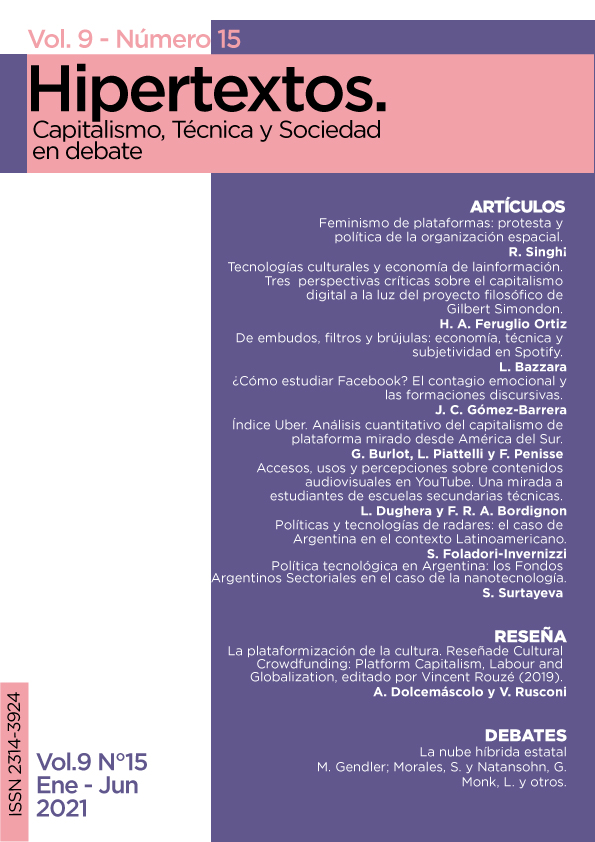Feminismo de plataformas: protestos e política da organização espacial
DOI:
https://doi.org/10.24215/23143924e026Palavras-chave:
ativismo feminista, plataformas de mídia, política, organização espacialResumo
Este artigo questiona a utilidade política das plataformas como mídia para a resistência feminista. Usando exemplos de #MeToo, e da Marcha das Mulheres em Washington, movimentos que confiaram nas plataformas para revigorar o que Sarah Banet-Weiser chamou de "feminismo popular" (2018), eu defendo que plataformas comuns de mídia tendem a inferir uma suposição subjacente de segurança, privilégio e poder em relação ao espaço social. Ao destacar como as pessoas do BIPOC se organizam no espaço social, defendo que o foco na amplificação e elevação, facilitado pela lógica das plataformas, obscurece as necessidades daqueles que resistem nas margens. Apresento as estratégias espaciais empregadas por aqueles que devem negociar o espaço de forma diferente, para desafiar a centralidade das plataformas como mídia a estrutura do protesto feminista contemporâneo.
Referências
Baer, H. (2010). Redoing Feminism: Digital Activism, Body Politics, and Neoliberalism. Feminist Media Studies 16.1, p.17-34.
Banet-Weiser, S. (2018). Popular Feminism: #metoo. LA Book of Reviews.
Battersby, S. J. (2016, 2 de abril). Inside Toronto’s Black Lives Matter Camp.
The Toronto Star, https://www.thestar.com/news/gta/2016/04/03/inside-torontos-black-lives-mattercamp.Html
Bratton, B. H. (2015). The Stack: on Software and Sovereignty. MIT Press.
Brock, A. (2012). From the Blackhand Side: Twitter as a Cultural Conversation. Journal of Broadcasting and Electronic Media, 56:4, p.529-549.
Daniels, J. (2015). The Trouble with White Feminism: Whiteness, Digital Feminism and the Intersectional Internet, En Noble, S.U. and Tynes, B.M (eds), The Intersectional Internet: Race, Sex, Class and Culture Online. New York: Peter Lang Publishing.
Feigennbaum, A. (2014). Resistance Matters: Tents, Tear Gas and the ‘Other Media’ of Occupy. Communication and Critical/ Cultural Studies. 11-1, p.15-24.
Gajalla, R. (2012). Cyberculture and the Subaltern: Weavings of the Virtual and Real. Lexington Press.
Hands, J. (2013). Platform Communism. Culture Machine, 14, p. 1-24.
Hedge, R. S. (2011). Circuits of Visibility: Gender and Transnational Media Cultures. NYU Press.
Keller, J. (2012). Virtual Feminisms. Information, Communication & Society 15.3, p.429-47.
Kino-nda-niimi Collective (2104). The Winter We Danced: Voices from the Past, the Future, and the Idle No More Movement. Manitoba: ARP Books.
Langois, G. y Elmer, G. (2013). The Research Politics of Social Media Platforms. Culture Machine. Vol.14, p.1-17.
McLuhan, M. (1964). Understanding media. London: Sphere Books.
McPherson, T. (2014). Designing for Difference. Differences: A Journal of Feminist Cultural Studies, 25:1, p. 177-188.
Moss, P. y Maddrell, A. (2017). Emergent and divergent spaces in the Women’s March: the
challenges of intersectionality and inclusion. Gender, Place & Culture, 24:5.
Noble, S. U. y Tynes, B. M. (2015). The Intersectional Internet: Race, Sex, Class and Culture Online. New York: Peter Lang Publishing.
Packer, J. y Crofts Wiley, S. B. (2012). Communiction Matters: Materialist Approaches to Media, Mobility and Networks. Routledge.
Puar, J. (2015). Queer Times, Queer Assemblages. Social Text, 23, p.121–139.
Puar, J. (2011). ‘I would rather be a cyborg than a goddess’ Intersectionality, Assemblage, and Affective Politics. European Institute for Progressive Cultural Policies (Transversal: inventions).
Rentschler, C. (2015). #Safetytipsforladies: Feminist Twitter Takedowns of Victim Blaming. Feminist Media Studies 15.2, pp. 353-356.
Rottenberg, C. (2013, 13 de diciembre). Can #MeToo Go Beyond White Neoliberalism? Aljazeera http://www.aljazeera.com/indepth/opinion/metoo-white-neoliberal-feminism-171213064156855.html
Sharma, S. (2008). Taxis as Media: A Temporal Materialist Reading of the Taxicab. Social Identities: Journal of Race, Nation, and Culture, 14.4, p.457-464.
Srnicek, N. (2016). Platform Capitalism. Cambridge: Polity.
Sullivan, A. (2018, 12 de enero). It’s Time to Resist the Excesses of #MeToo. NY Mag. http://nymag.com/daily/intelligencer/2018/01/andrew-sullivan-time-to-resist-excesses-of-metoo.html
Taylor, A. (2014). The People’s Platform: Taking Back Power and Culture in the Digital Age. New York: Metropolitan Books.
Willoughby, V. (2017, 23 de enero). Signs At the Women’s March on Washington Called out White Feminism. Teen Vogue, https://www.teenvogue.com/story/signs-at-the-womens-march-on-washington-called-out-white-feminism

























